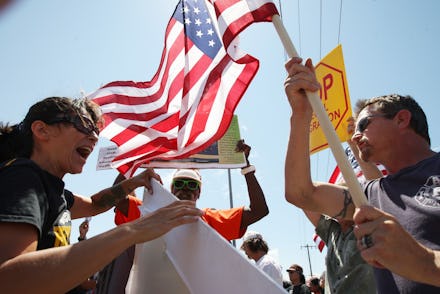Yes, the Tea Party Has a Big Fat Race Problem

The news: With midterm elections just days away, it looks like the Tea Party will have little trouble mobilizing its base: a Gallup poll last week found that 73% of self-identified tea partyers were "extremely/very motivated" to participate in the upcoming elections, a much higher number than other Republicans or Democrats.
But while the Tea Party might be riding high — nearly a quarter of Americans support the party in some form — there's some bad news about where this support is coming from. According to a new study published in Social Science Research, one of the key factors fueling the Tea Party is racial resentment, especially against blacks and Latinos.
"At least to some degree, the Tea Party movement is an outlet for mobilizing and expressing racialized grievances which have been symbolically magnified by the election of the nation's first black president," the researchers wrote. "The findings suggest that, among conservatives, racial resentment may be a more important determinate of membership in the Tea Party movement than hard-right political values."
Race is an undeniable problem for the Tea Party. For the study, researchers analyzed the results of a 2010 phone survey with nearly 1,000 participants, around 12% of whom self-identified as members of the Tea Party. The participants were asked a series of questions about their political ideology as well as if they agreed with statements on race, such as "Latinos take away economic resources that should go to others, like jobs and welfare," and "It's really a matter of some people not trying hard enough; if blacks would only try harder, they could be just as well-off as whites."
And while the researchers found that there were ideological differences among those who identified as tea partyers, racial resentment remained a consistent factor "largely independent" of ideology.
"The minority of conservatives who consider themselves to be Tea Party movement members tend to be more racially resentful, white, male, less-educated, and live in counties that have experienced recent black population growth," the researchers wrote. "Individuals were more likely to claim Tea Party movement membership if they resided where the black population expanded."
These findings are very much in line with previous research that has found that the Tea Party's rise can be tied to racialized backlash to a black president and "motivated by perceived threats to the racial hierarchy."
So while the Tea Party might have a strong presence at the polls in the coming days, it still has an ugly identity problem on its hands, especially if it wants to reach broader audiences with its message.